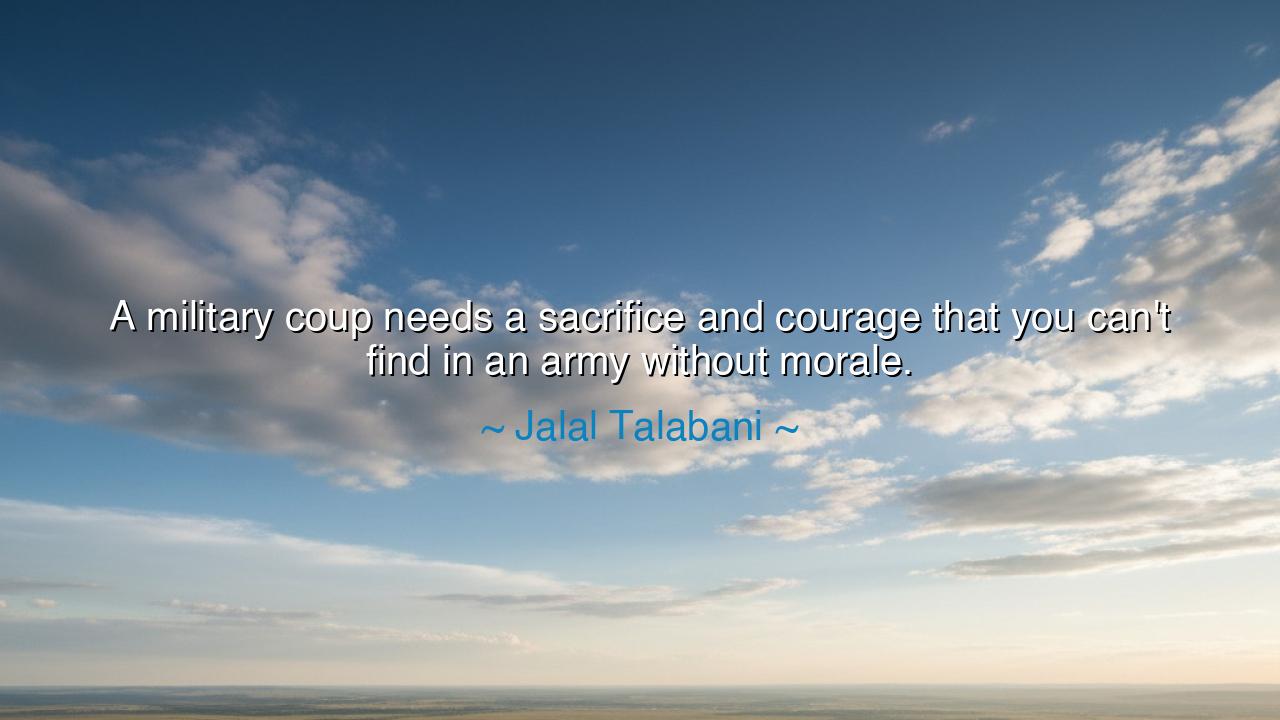
A military coup needs a sacrifice and courage that you can't find
A military coup needs a sacrifice and courage that you can't find in an army without morale.






The Kurdish leader and statesman Jalal Talabani, a man forged in the fires of revolution and resistance, once spoke these solemn words: “A military coup needs a sacrifice and courage that you can’t find in an army without morale.” This statement, simple yet profound, carries within it not only the wisdom of a soldier but the understanding of a philosopher who has witnessed both triumph and tragedy. Talabani’s words are not merely about armies or politics—they speak to the very heart of human endeavor, to the power of spirit, belief, and purpose that must dwell within any man or woman who seeks to change the course of destiny.
In its literal sense, the quote reveals a truth known to every commander and leader since the dawn of warfare: an army’s strength does not lie in weapons, numbers, or command—but in morale, the fire that burns in the souls of its warriors. Sacrifice and courage are not born from orders, nor can they be forced by fear. They arise only when men believe in something greater than themselves—when they fight not for conquest or greed, but for justice, freedom, or the dignity of their people. An army without morale is a body without a heartbeat. It marches, but it does not live; it obeys, but it does not believe. And from such lifeless ranks, no true revolution, no noble uprising, can ever be born.
Talabani, who led his people through decades of struggle against oppression, knew this truth from experience. The Kurds, long denied their homeland, fought not because they were powerful, but because they carried within their hearts an unbreakable spirit. Against tanks and tyranny, they rose from the mountains again and again, driven by a love for freedom that no defeat could extinguish. This is the morale of which Talabani speaks—the invisible force that makes men willing to face death for the sake of life itself. It is the same spirit that guided Spartacus against Rome, Washington against empire, and every people who have ever dared to stand against injustice.
History offers many examples where morale, not might, determined the fate of nations. Consider the fall of mighty armies whose soldiers, though armed and trained, lacked belief. The French army of 1940, though vast and well-equipped, fell quickly before the Germans, not because it lacked strength, but because it lacked faith—in its leaders, in its cause, in its own destiny. Contrast this with the ragged revolutionaries of Vietnam, who, with scarce weapons and endless suffering, defied the greatest powers on earth. Their courage and sacrifice came not from discipline alone, but from an unyielding conviction that their land and freedom were worth dying for. Thus, Talabani’s words transcend the battlefield—they teach that morale, born from belief, is the soul of all victory.
In a deeper sense, this quote is not only about armies, but about the human spirit itself. Each of us, in the battles of our own lives, commands an inner army—our will, our convictions, our dreams. Without morale, without belief in what we fight for, we falter. We may have the tools, the plans, even the opportunities, yet we crumble when hardship comes. But when we possess faith—faith in the righteousness of our path, faith in the worth of our struggle—then we can face the impossible. The man or woman who fights with conviction is mightier than legions who fight in doubt.
Therefore, Talabani’s wisdom extends to every heart that seeks to overcome adversity. If you would achieve greatness—whether in war, in art, in justice, or in the quiet victories of daily life—you must first build morale within your soul. You must know what you fight for. You must believe that the cost is worth the crown. From that belief comes courage, and from courage, sacrifice, and from sacrifice, the birth of something eternal. Without morale, you will obey your fears; with it, you will command your destiny.
So let this teaching endure among the generations: the mightiest weapon is not the sword, nor the army that bears it—it is the spirit that wields both with purpose. A man of high morale can turn defeat into triumph, and even in death, his legacy becomes immortal. Build your courage not upon pride, but upon conviction. Let your sacrifices be guided by love, not rage. For when your morale burns like a sacred flame, no tyranny, no despair, and no failure can extinguish it. This is the lesson Talabani leaves us: that true power belongs not to those who command armies, but to those who command the hearts that march within them.






AAdministratorAdministrator
Welcome, honored guests. Please leave a comment, we will respond soon